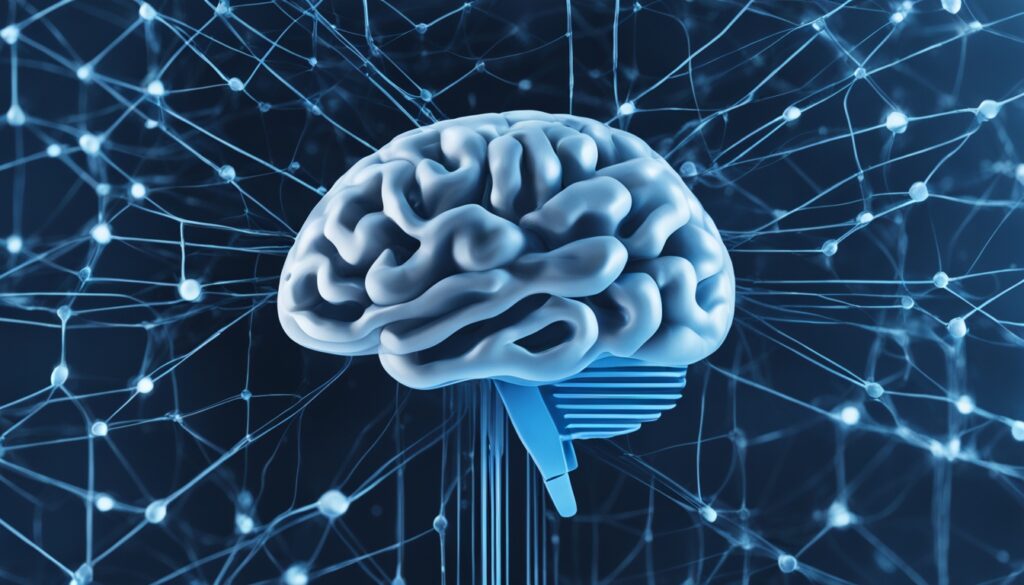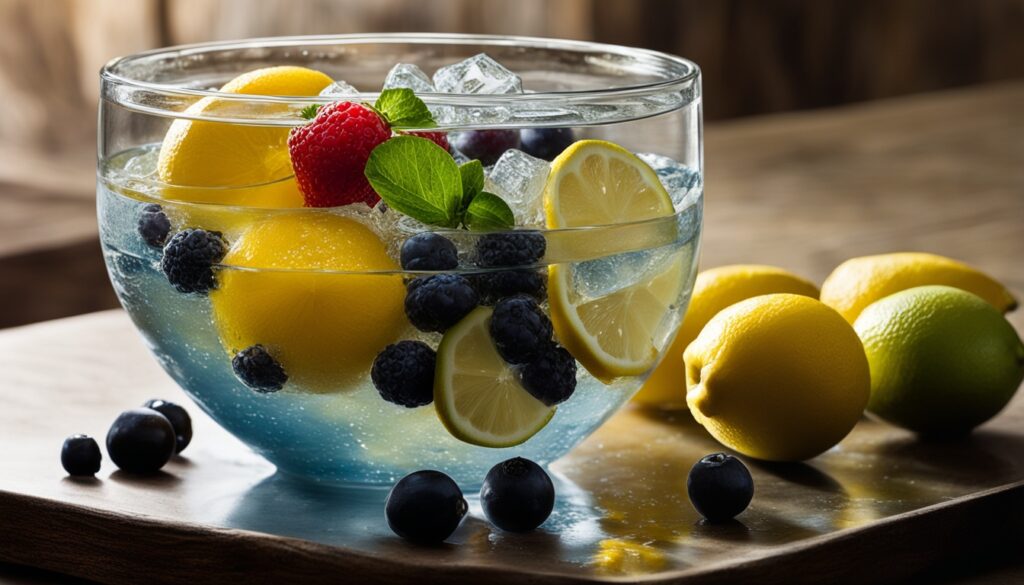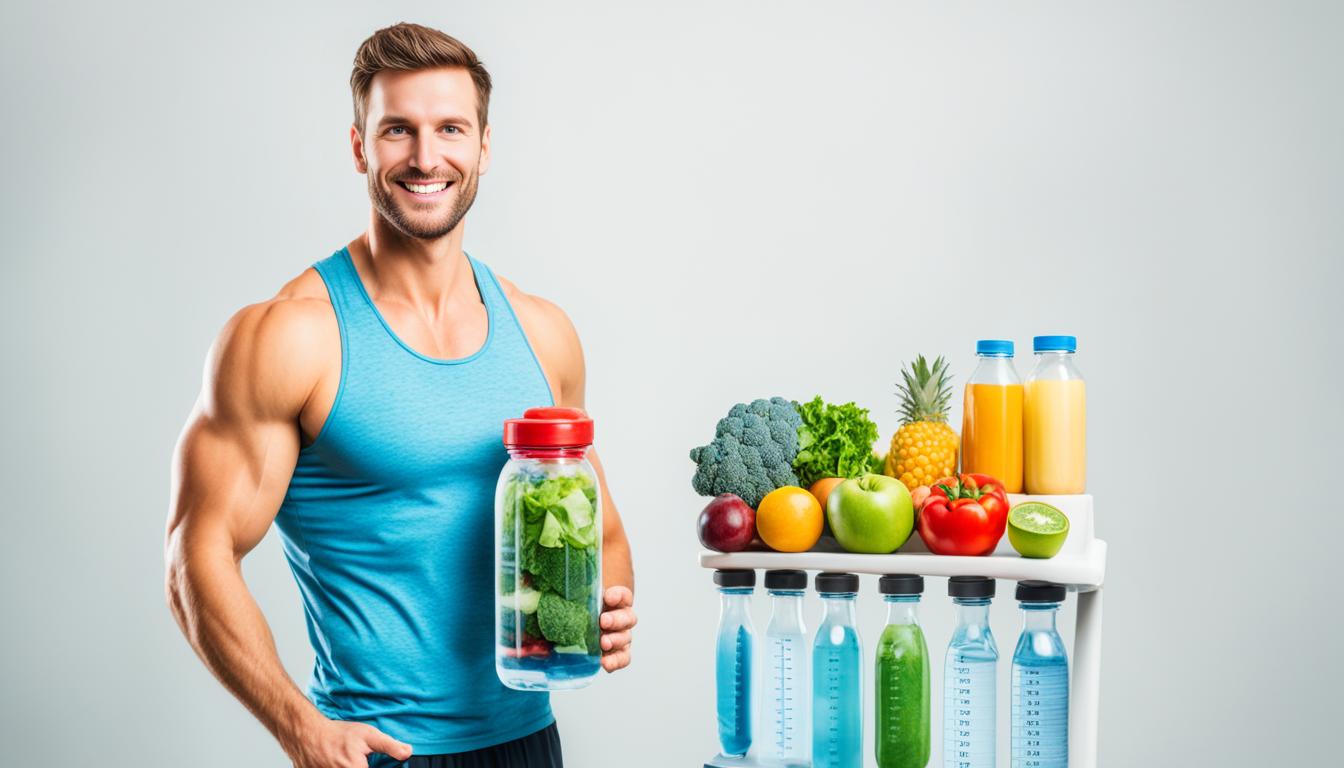Hydration is key to staying healthy. Our bodies are about 60% water. It helps with digesting food, moving nutrients around, and managing temperature. Drinking water is essential for getting rid of harmful stuff, keeping blood pressure steady, and keeping the heart calm. Being hydrated also keeps us fit and makes our skin look great.
Not drinking enough water can cause many problems. You might feel dizzy, tired, and see your feet swell. You could also get headaches or, in serious cases, heat stroke1. While the advice is normally to drink eight glasses daily, how much you need varies. It depends on things like how active you are, the weather, your general health, and if you’re pregnant or nursing2. It’s not enough to just wait until you’re thirsty to drink. It’s better to keep an eye on your urine color. You should aim for it to be light and clear1. The U.S. National Academies say men should drink about 15.5 cups of fluids per day. For women, it’s roughly 11.5 cups2.
Key Takeaways
- Approximately 60% of the human body is composed of water.
- Essential functions supported by hydration include digestion, nutrient transport, and temperature regulation.
- Dehydration symptoms could lead to dizziness, fatigue, swollen feet, headaches, and even heat stroke1.
- Thirst may not be a reliable indicator of hydration; check urine color instead1.
- The U.S. National Academies recommend 15.5 cups of fluids per day for men and 11.5 cups for women2.
The Importance of Drinking Water
Water is life. It’s vital for keeping our bodies working right. Not getting enough water can hurt our health. This is why it’s suggested to drink about 6 to 8 eight-ounce glasses of water every day3.
Cellular Processes
Our cells need water to work. It helps them take in nutrients and get rid of waste. Because our bodies are made up mostly of water, we must drink enough to stay balanced4. Even losing a little bit of water, like 2%, can cause problems.
This small loss can lead to dehydration. When we’re dehydrated, our cells can’t work properly4.
Physical and Mental Performance
Staying hydrated is key for doing well physically and mentally. For athletes, losing water through sweat is common. But it affects their performance. Drinking enough water keeps the body and mind sharp4.
Being just a little dehydrated can lower brainpower and energy. Yet, upping your water intake can make a big difference. It helps with fitness and thinking clearer4.
Impact on Mood and Cognition
Drinking enough water can make you feel better and think clearer. It can help reduce headaches and lessen the pain of migraines4.
Also, water helps with focusing, remembering, and thinking. This means it can fight tiredness and worry. Staying hydrated supports good mental health.
How Much Water Should You Drink Daily?
Knowing how much water you need each day might seem hard. But, guidelines exist to help you stay hydrated. These rules can be adjusted based on different factors for each person.
General Guidelines
According to the U.S. National Academies of Sciences, men should drink about 3.7 liters (15.5 cups) of fluid daily. For women, the target is 2.7 liters (11.5 cups)5. Eating foods also helps meet these needs. Generally, adults should have 2 liters (8 cups) of water a day6. Here are more specific goals:
People like those who are pregnant or breastfeeding need more water. Pregnant women should aim for 10 cups, and those breastfeeding need 12 cups5. Children and teens require 6 to 8 cups each day, depending on their age5.
Factors Affecting Individual Needs
Many things decide how much water someone needs each day:
- Age and Gender: Water needs change with age and vary by gender.
- Body Weight: Larger people might need more water. You can calculate how much you need by dividing your weight in pounds by two to get the ounces6.
- Exercise and Activity Levels: Those who move a lot need more water. After every 30 minutes of exercise, drink 8 more ounces. If you plan to exercise, add 12 more ounces for every 30 minutes7.
- Environmental Conditions: Hot or humid weather means you should drink more water.
- Health Status: Conditions like pregnancy or illness can make you need more water7.
Calculating Your Personal Requirements
Everyone needs a different amount of water. It’s important to figure out how much you should drink.
One easy way is to drink half your weight in pounds as ounces. So, if you weigh 150 pounds, drink 75 ounces (over 9 cups) of water a day6.
Exercise and the weather can also change your water needs. After every 30 minutes of exercise or heat exposure, drink another 8 ounces. Paying attention to your urine color helps too: dark means drink more, while light or clear is a sign you’re hydrated6.
The Ultimate Guide to Staying Hydrated Throughout the Day
Staying hydrated means more than just water. The right food and drinks are key. Choose mineral water without sugar and too much caffeine. This helps a lot.
Foods like watermelon, strawberries, cucumbers, and greens are great for hydration8. About 20% of the water we need each day comes from food9. So, eating water-rich foods helps you stay hydrated.
A BPA-free water bottle is great for keeping track of your water intake. It’s important because on average, adults in the U.S. drink only 44 ounces of water a day from 2015 to 201810. But, we should aim for 91 ounces if you’re a woman and 125 ounces if you’re a man10.
It’s smart to set goals for how much water you want to drink. Lisa Moskovitz suggests dividing your weight by two for your daily water needs10.
Watch your urine color to see if you’re drinking enough water. Light yellow means you’re hydrated9. Special water bottles like HidrateSpark TAP and HidrateSpark PRO can help set and adjust your hydration goals based on how active you are10.
If you’re a little dehydrated, you might feel more tired or in a bad mood. Drinking water regularly, especially when it’s hot or when you’re active, keeps you feeling good and healthy8.
- Try to drink water with your meals to stay hydrated9.
- Eat foods like cantaloupe, strawberries, and greens to help you drink enough water10.
- Let smart water bottles remind you to drink throughout the day
- Keep an eye on your urine color to make sure you’re drinking enough water9.
Health Benefits of Staying Hydrated
Drinking enough water every day is key to good health. It impacts our fitness, how our brain works, and our skin’s condition.
Improved Physical Fitness
Hydrating well is vital for fitness. Our body is mostly water. So, good hydration keeps our body cool during workouts, helping us move better11.
It also feeds our muscles with nutrients for energy and repair. And, it keeps our kidneys healthy by flushing out waste. This helps prevent kidney stones and UTIs12. Thus, water is crucial for staying active and well.
Optimal Brain Function
Our brain needs water to work well, affecting how we think. Not drinking enough can hurt memory and focus11. Sipping water assures the brain performs top-notch for any mental task12.

Enhanced Skin Health
Hydrating boosts skin health, making it look better. It lessens wrinkles and blemishes by making skin more stretchy11.
This keeps your skin bright and soft, fighting off dryness and aging looks. So, drinking water is a secret to youthful skin.
Hydrating Foods and Drinks
Staying hydrated means eating and drinking right. By choosing the right foods and drinks, you meet your daily fluid needs. At the same time, you get important nutrients.
Water-Rich Fruits and Vegetables
Fruits and veggies full of water keep you hydrated. Think about watermelon, spinach, cucumbers, and oranges. They cover about 20% of the water you need each day13. Also, milk and yogurt help keep you hydrated13. So, eating a variety of these foods gives you water, vitamins, and minerals.
Beverages That Contribute to Hydration
Drinking the right fluids is key. Herbal teas, mineral water, and coconut water are great picks. Men need 15.5 cups and women need 11.5 cups a day13. Sports drinks with electrolytes are good for active people. They help replace lost fluids after hard workouts. If you want to know more about staying hydrated, check out this hydration guide.

Avoiding Dehydrating Drinks
Not all drinks are good for staying hydrated. Drinks with lots of sugar or alcohol can dry you out. Some fizzy drinks might even make you more dehydrated and stir up other health problems13. So, watch what you drink to keep your hydration levels up.
Hydration Tips for Active Lifestyles
For those who are always on the move, staying well-hydrated is key. It keeps performance high and lowers health risks. Surprisingly, losing just 2% of your body’s water can hurt how well you perform14. Drinking enough water helps your body work better, makes working out easier, and improves how fast you get better after.
Pre- and Post-Workout Hydration
Drinking enough water before and after you workout is important. Before you start, aim to drink 17-20 ounces of water about two to three hours before. Then, have another 8 ounces right before you begin to sweat14. After your workout, make sure to drink 16-24 ounces for every pound lost during exercise. This will help you recover properly and avoid feeling tired or having muscle issues14. Always choose clean, pure water for the best hydration results14.
Hydration Strategies During Exercise
While you work out, sip on 7-10 ounces of water every 10-20 minutes to stay hydrated14. If you’re working hard in the heat, you might benefit from sports drinks too. These drinks help replace important minerals like sodium, key for muscle health and staying hydrated14. Remember, water is always the best choice, but keeping an eye out for signs of dehydration, like dry skin, is important too14.
Following these simple hydration tips can make a big difference in how well you do in sports and how you feel overall. Hydration is vital for those who love to move.
Source Links
- Staying Hydrated, Staying Healthy
- How much water do you need to stay healthy?
- Hydration: Why It’s So Important – familydoctor.org
- 7 Reasons Why You Should Drink More Water
- How Much Water Should I Drink?
- How Much Water Do I Need? A Guide to Staying Hydrated – BJC HealthCare
- How to calculate how much water you should drink
- 6 Simple Ways to Stay Hydrated
- 10 tips for staying hydrated this summer
- 6 Smart Tips for Staying Hydrated Throughout the Day
- The Benefits of Staying Hydrated | Kelsey-Seybold Clinic
- 15 benefits of drinking water and other water facts
- The Ultimate Guide To Hydration
- Hydration Hacks: Maximize Performance with Hydrated Exercise – Leaf Home




